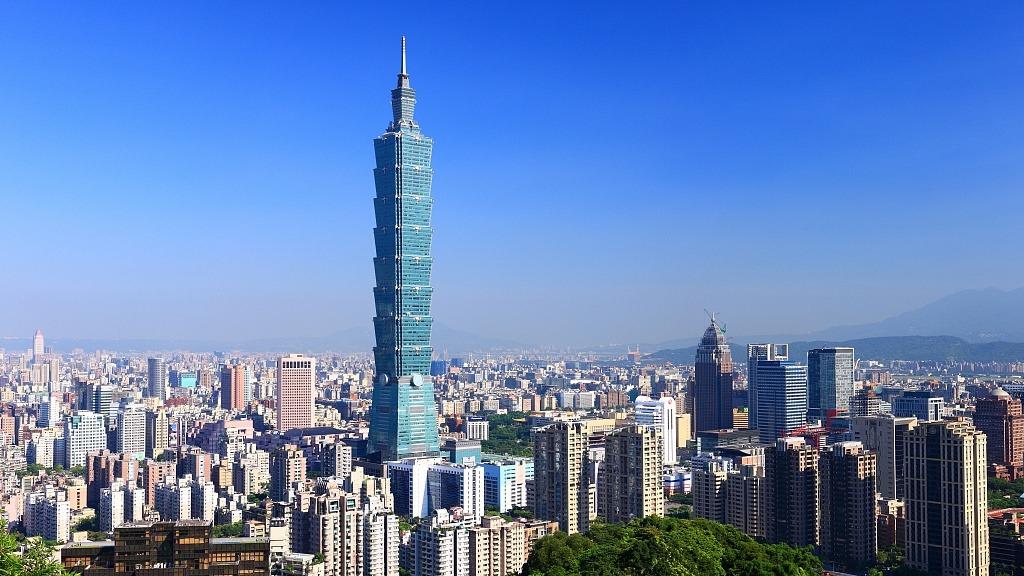 In this undated file photo the Taipei 101 skyscraper commands the urban landscape in Taipei, Taiwan. (PHOTO / XINHUA)
In this undated file photo the Taipei 101 skyscraper commands the urban landscape in Taipei, Taiwan. (PHOTO / XINHUA)
Taiwan's pro-independence politician Lai Ching-te being elected the island's leader cannot change the Chinese mainland's determination to achieve national reunification.
Lai, who once described himself as a "pragmatic worker for Taiwan independence", only got around 5 million votes, or about 40 percent of the popular vote. It fell short of the more than 8 million votes his predecessor did in 2020. The rival candidate of the Kuomintang garnered more than 3.9 million votes and the Taiwan People's Party about 3.1 million votes, or nearly 60 percent in total. That's why Lai does not represent the majority of Taiwan residents.
Lai, a 64-year-old public health and rehabilitation graduate, ought to weigh the election outcome conscientiously. The fact that he doesn't have the support of the majority of the people on the island should temper his pro-independence activism that, ultimately, imperils cross-Strait stability.
In his victory speech, Lai pledged to preserve the status quo across the Taiwan Strait. However, it shouldn't be the first (and last) time that a political firebrand, after gaining a top political post, has mellowed — hopefully not just superficially.
As expected, the Chinese Foreign Ministry said on Saturday night that whatever changes take place in Taiwan, the fact that the region is part of China will not change. The ministry also reaffirmed that the Taiwan question is China's internal affairs and changes to the situation on the island will not affect the fact that there is only one China in the world. The ministry also described the one-China principle as the solid anchor of peace and stability in the Taiwan Strait.
Unfortunately, the island's ruling Democratic Progressive Party continues to reject the 1992 Consensus outright. I hope Lai brings himself to accept the 1992 Consensus, reached by the two sides of the Strait during a meeting in Hong Kong that year, according to which there is only one China.
While watching a raft of journalists from international TV news channels interviewing international relations scholars and experts about the Taiwan election results on Saturday night, I noticed one of them, a mainland-based commentator, saying, quite rightly, that Beijing is ready to talk with Taipei about anything based on the condition — that the Taiwan authorities accept that there is only one China and that Taiwan is an inalienable part of China. That's a reasonable proposition. Lai should mull over it.
There are many different ways that national reunification can be achieved in a peaceful and mutually beneficial manner.
Large parts of the global news coverage on Saturday night were desperately focused on Taiwan's purported "otherness" vis-à-vis the mainland, insinuating that the two sides of the Strait are inherently different. I beg to disagree. I've always found Taiwan to be "very Chinese", similar to Fujian province in fact (which should be no surprise to anyone familiar with Chinese history, considering that most Taiwan residents are descendants of people from Fujian who began to move in droves to the island in the 17th century). Fujian and Taiwan also share the same dialect (Southern Min aka Hokkien) and similar cuisines and other cultural traits. Also, about 15 percent of Taiwan's 23 million residents are Hakka who have their roots on the mainland.
Taiwan has always been a part of China. The Chinese people were the first to develop Taiwan. Since the Yuan Dynasty (1271-1368), successive Chinese governments have established administrative institutions in Taiwan and effectively governed the island.
In the mid-17th century, Dutch colonists occupied Taiwan. The national hero Zheng Chenggong expelled the Dutch colonists in 1662 and recovered Taiwan. In 1895, due to the Qing government's defeat in the war with Japan, and under coercion from Japan, the unequal Treaty of Shimonoseki ceded Taiwan and the Penghu Islands to Japan. In July 1937, the Chinese people began a nationwide war of resistance against Japanese aggression. In 1945, Japan announced its surrender, unconditionally accepting the Cairo Declaration and the Potsdam Declaration, and returned Taiwan to China. With this, Taiwan returned to the Chinese territory and came under the sovereign jurisdiction of China.
Incidentally, Taiwan and Macao have some interesting aspects in common — the faithful in both regions worship the Chinese goddess Mazu, and Sun Yat-sen, the forerunner of China's democratic revolution, is revered both in Macao, where he practiced medicine and worked on the downfall of the enfeebled Qing Dynasty, and Taiwan, whose political system still contains elements of Sun's "Three Principles of the People".
There is always the possibility of certain forces or powers making every effort to preclude a cross-Strait rapprochement for geopolitical or other reasons. That's why, as far as the Taiwan question is concerned, we should always look out for squalls.
However, in his New Year's Eve address, the country's top leader reaffirmed his conviction that Taiwan and the mainland will "surely be reunified". Irrespective of the island election, China will continue to make efforts to realize national reunification.
The author is the director of Macau Post Daily
The views don't necessarily reflect those of China Daily.


